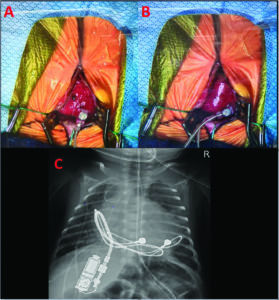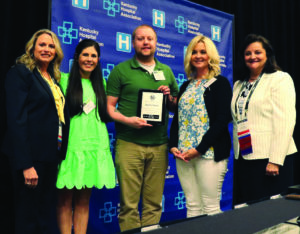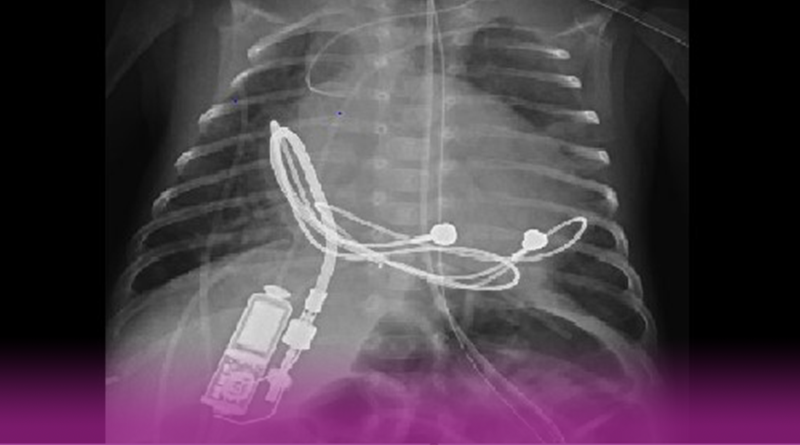A First for the United States: Norton Children’s Heart Institute Physicians Implant Tiny Pacemaker, Saving Infant’s Life
Patient born at 28 weeks with slow heart rate and congenital heart disease receives never before used pacemaker implant

LOUISVILLE On March 18, 2022 a multidisciplinary team within Norton Children’s Heart Institute, affiliated with the UofL School of Medicine, worked together to save the life of an infant born with congenital structural heart defects and complete atrioventricular block (CCAVB) that led to a slow heart rate. The patient was too small for the traditional path of care, driving the innovative team to perform the first known human implantation of a tiny pacemaker in a premature infant.
“It is remarkable how our team of pediatric specialists came together with the device company to offer a resolution for such a small patient weighing less than three pounds at the time of implant,” said Soham Dasgupta, MD, pediatric electrophysiologist, Norton Children’s Heart Institute and UofL assistant professor of pediatric cardiology. “This unique case is unlike any other and we are so pleased to see this patient thriving as a result of the innovative approach.”
Approximately 1 in 22,000 infants are born with CCAVB. Untreated, the condition has a high incidence of prolonged illness or death. The usual treatment involves implantation of a pacemaker once the patient meets a minimum body size, typically 4 1/2 to 5 1/2 pounds, to accommodate the implantable device. Taking time for the baby to grow while being otherwise treated, is strongly preferred for this situation. With this patient, however, the traditional plan was not working.
“In this instance, the patient was not of the optimal size and conservative medical management was unsuccessful, so a specially modified pediatric-sized pacemaker, also known as an implantable pulse generator (IPG), created by Medtronic was used,” Dasgupta said.


Dasgupta and his colleague, Christopher L. Johnsrude, MD, director of pediatric and adult congenital electrophysiology and UofL associate professor of pediatric cardiology, reviewed the relevant preclinical data from a procedure where a similar tiny pediatric IPG had been implanted in an adult Yucatan miniature pig, an animal with a heart that resembles a child’s heart.
Once it was determined the pediatric IPG was potentially compatible with the patient at Norton Children’s, Dasgupta worked with Norton Children’s Research Institute, affiliated with the UofL School of Medicine, and the manufacturer, to obtain local Institutional Review Board approval and emergency authorization from the U.S. FDA.
Once the device was in hand, the procedure to place the implant was completed over the course of a two-hour open-heart surgery. The tiny device measures 1.16 by 0.65 by 0.38 inches and weighs 0.18 ounces.

“While the operative steps might be comparable to the usual pacemaker implantation surgery, this surgery was especially delicate due to the very small size of the baby,” said Bahaaldin Alsoufi, MD, chief of pediatric cardiothoracic surgery, co-director of Norton Children’s Heart Institute and UofL professor of cardiothoracic surgery. “This tiny pacemaker generator was positioned in the abdominal wall on the right side and was connected to the usual leads that were attached to the heart. This novel device will provide the necessary support that the baby currently needs. At time of repair of the patient’s congenital heart defect in the future, we will be able to utilize these same leads and likely connect them then to a traditional larger pacemaker generator.”
Saint Joseph Hospital, Continuing Care Hospital Earn Kentucky Hospital Association Quality Awards; Hospital Volunteers Recognized for Maze Fidget Devices for Patients

LEXINGTON Saint Joseph Hospital, Continuing Care Hospital and the Volunteer Guild at Saint Joseph Hospital have all received awards from the Kentucky Hospital Association (KHA) for their commitment to patient care and safety. The facilities and volunteers were recognized at the KHA Annual Convention on May 18, 2022.
Saint Joseph Hospital has received a 2022 KHA Quality Award, receiving a perfect score in KHA’s grading system. Saint Joseph Hospital was recognized for its use of a blood culture diversion device that helps decrease the rate of blood culture contamination in the emergency department.
Continuing Care Hospital, a long-term acute care hospital located within Saint Joseph Hospital, received a 2022 KHA Quality Award. It was the ninth time CCH has been recognized with the award. The facility was recognized for its ventilator weaning rates during FY19, FY20, and FY21.
Additionally, the Volunteer Guild at Saint Joseph Hospital and Saint Joseph East received a Helping Accomplish Noteworthy Duties Successfully (HANDS) Award for its marble maze fidgets project.
The KHA Quality Awards recognize the hospital leadership and employees for providing explementary care and commitment to innovation and optimal patient services. The HANDS Awards are given to volunteers for particular projects making a difference within hospitals.
SEND YOUR NEWS ITEMS TO MD-UPDATE > news@md-update.com



